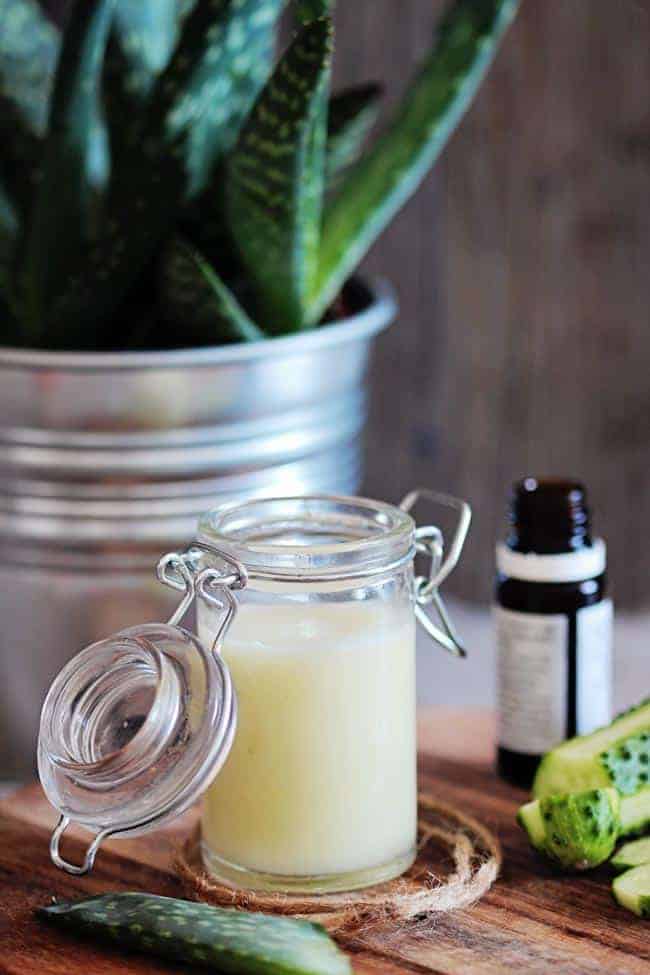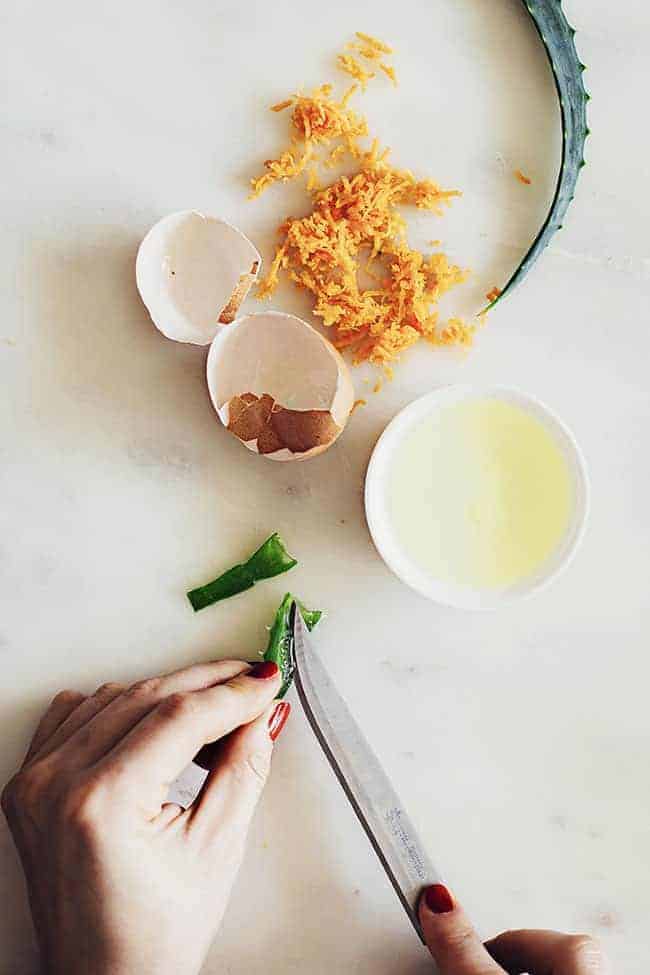Most of us have heard that aloe vera is the go-to treatment for sunburns, right? For the longest time, I believed that sunburns were the only thing that aloe vera was good for. How wrong I was!
The Egyptians actually coined the phrase the plant of immortality [source], so it’s clearly an ingredient we should consider in our beauty products. Aloe vera has quite a few uses that can really up your skincare game.
This little houseplant is so much more than just a remedy for burns! It’s the perfect all-purpose plant to keep on hand. They’re super easy to care for (trust me!), and they add a little greenery to your room when kept in a bright, sunny spot.
Here are just a few of the many ways that aloe vera can benefit the skin.
1. Soothing for burns
While most of us have probably heard that aloe vera is great for burns, it’s worth mentioning that there is scientific evidence to support this claim. A clinical study conducted on the burn-healing effects of aloe vera found significant evidence suggesting that it was beneficial in healing first- and second-degree burns [source].
One of my favorite ways to use it is to keep a live plant in my house and simply cut off a portion when somebody gets burned. That way, I have the freshest aloe vera possible.
2. Anti-inflammatory
As I mentioned above, aloe vera isn’t just a burn remedy—it’s also beneficial for all types of skin irritation. Its anti-inflammatory and antioxidant properties make it a great choice for healing disrupted skin [source]. Eczema, dermatitis, psoriasis, hives, and acne are all skin conditions stemming from an inflammatory mechanism.
Since aloe vera gel has a mild aroma and gentle action, I find it to be more tolerable than some of the other store-bought solutions. I usually have a bottle or two of it lying around the house for this very reason!
3. Moisturizes and reduces visible signs of aging
Herbalists have long believed aloe vera to be naturally moisturizing and able to reduce visible signs of aging; scientific research supports this theory for topical aloe vera as well as when it’s taken internally as a supplement [source].
In fact, one study found that participants who wore aloe vera gel gloves over several days found that they had “improved skin integrity [and] decreased appearance of fine wrinkling,” as well as decreased redness due to occupational dry skin [source]. I especially love to use aloe vera in my facial products!
4. Antiseptic
Aloe vera contains a number of beneficial components that contain antiseptic, antiviral, antibacterial, and antifungal properties [source]. This makes it an excellent choice for your natural first aid kit, especially if you have children or are prone to accidents.
Cuts, scrapes, burns, abrasions, and bites could all benefit from a dab of aloe vera, so it’s good to have some on hand during your outdoor adventures. If I had to choose only one item (besides bandages) to put in my first aid kit, it would be aloe vera because of its many uses!
5. Wound healing
Did you know that aloe vera is also beneficial in wound healing? Numerous studies have shown that aloe vera expedites the healing process [source], likely due to its ability to increase collagen activity [source]. This is why it’s good to make sure you’ve got either a live aloe plant on hand or a bottle of quality aloe vera gel.
One reason I like it so much is that, even though it contains awesome wound-healing properties, it doesn’t burn when you put it on your skin like some commercial products do. This makes it especially beneficial to use with children or anyone who has sensitive skin.
6. Beneficial for acne
Due to its anti-inflammatory and antibacterial properties, it’s easy to imagine that aloe vera may be beneficial when dealing with acne. Luckily, research happens to agree.
In fact, one study found that aloe vera combined with a common acne treatment (tretinoin cream) was significantly more effective than just using tretinoin alone [source]. Often, pharmaceutical acne treatments can be very irritating to the skin, so this is good news for those of us with sensitive skin!
Aloe Vera Skincare Recipes
Besides treating wounds and burns, aloe is a fabulous moisturizer, acne fighter, and anti-aging tool. Aloe contains vitamins C, E, and other antioxidants [source] and has anti-inflammatory and antimicrobial properties [source].
It’s great for all types of skin, too. Whether you have dry, oily, or combination skin, aloe is an amazing choice to incorporate in your creams, masks, and serums.
Check out these 14 aloe recipes—there’s truly something for everyone, and these recipes couldn’t be more simple.
1. Face wash
Whether your skin is problematic or you just want to keep it looking healthy, aloe vera can help by exfoliating, soothing inflammation, increasing the skin’s moisture content, and reducing the appearance of wrinkles and acne. This face wash recipe is especially decadent with the addition of chamomile and rose essential oils and rose water. You’ll love how your skin feels after using it!
2. Hydrating face serum
Face oils work well when applied at nighttime, but what about in the day? That’s where homemade serums come in, and aloe makes an outstanding serum base. Serums are some of the easiest products to make, and you can use ingredients that are suited to your skin type—like aloe vera!
Underneath your makeup, it works to soothe skin, remove blemishes, and plump up the skin to erase wrinkles. The awesome part of this serum recipe is that you can use just about any carrier oil with it, as well as any essential oil, depending on your skin type.
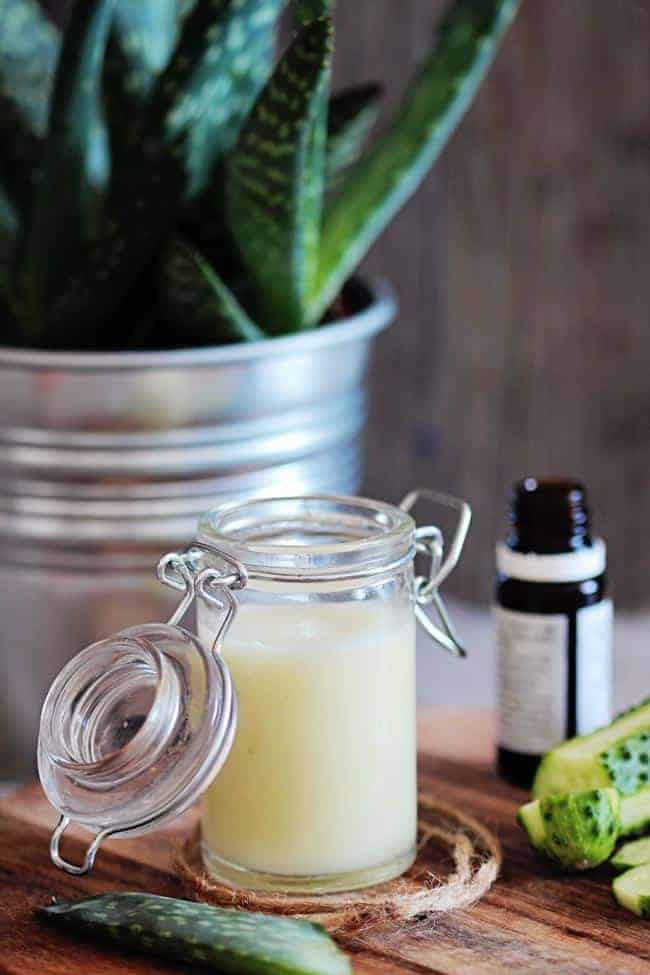
3. Acne-fighting mask
Aloe is not only calming to irritated skin, but it’s a powerful acne fighter. And combined with tea tree essential oil, it makes a mighty mask.
It also includes cucumber to soothe your skin while providing it with plenty of vitamin E and potassium, which can help reduce blemishes. And you won’t have to worry about your skin getting dry or irritated like it does with commercial acne treatments.
4. Cooling lotion
Cooling lotion sounds light and sensible for the summer, doesn’t it? Lotions I make myself are my absolute favorite way to use aloe vera. I love the added moisture boost it gives the lotion; plus, it helps give it a nice creamy feel.
This Cooling Homemade Lotion uses just three ingredients and feels heavenly during the warm summer months. And, the coconut oil is actually whipped, so the lotion doesn’t weigh you down too much.
5. Facial toner
For many, toners are an important part of their skincare routine. They’re great for helping to cleanse the skin, tighten pores, and support skin health. While many store-bought toners dry out the skin, homemade facial toners are made with ingredients suited to your specific skin type. Instead of drying out your skin, they help nourish it!
6. Face pack
This face pack combines aloe, lemon juice, and honey. Aloe vera gel and lemon juice are both full of micronutrient-rich ingredients for the skin, making for a fantastic therapeutic face pack.
Lemon has excellent exfoliant properties that gently remove dead skin cells and antioxidants that help to nourish new ones [source], while the aloe soothes and cools. It can also help treat acne, fade pigmentation, and improve acne scars.
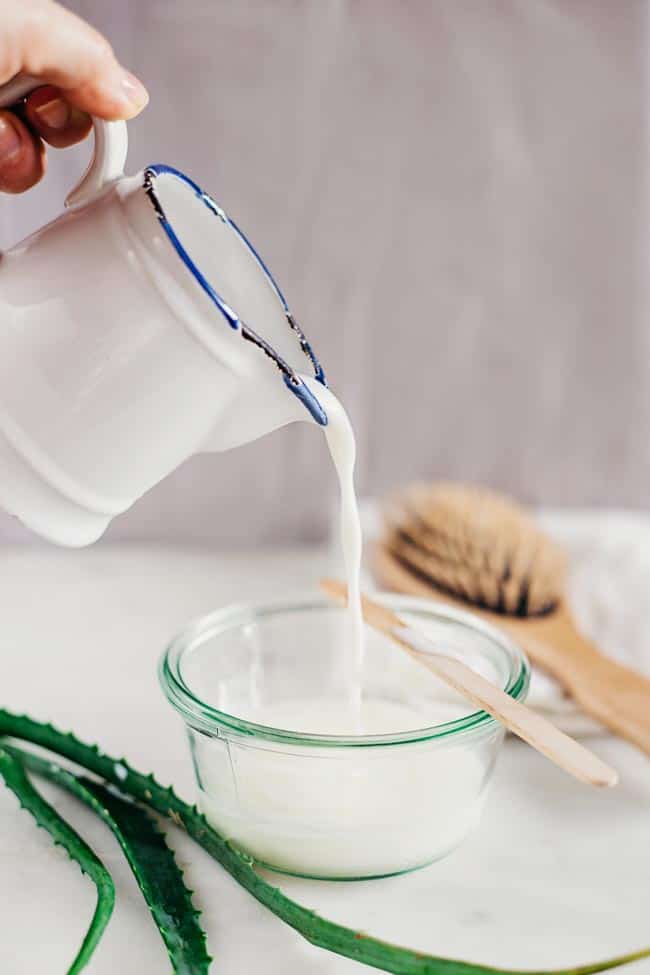
7. Scalp & hair mask
If you’re suffering from a dry or itchy scalp or other hair woes, aloe’s soothing properties are sure to help you. It’s also a great mask to soothe irritation if you routinely dye your hair. Best of all, it only takes 1/2 cup of aloe vera gel and 1 tablespoon of coconut milk.
Aloe also makes a superb hair styling gel! And you can customize the hold for your specific hair type.
8. Longer lash conditioning serum
Not only is aloe great for skin, but it’s also beneficial for your lashes. Commercial serums are good, but they’re often very pricey.
Eyelash conditioner gives the impression of fuller lashes, which is perfect for the summer when you want to wear a little less makeup. All this recipe requires is two ingredients, aloe vera, and castor oil, and you’ll be on your way to fuller, longer lashes.
9. Makeup remover
Some makeup removers are too gentle, leaving you rubbing your eyes too much (which can lead to more wrinkles), while others are too harsh. But it’s important for your remover to be simple, right?
After all, you’re essentially getting rid of chemicals from your face after a long day. This makeup remover keeps it simple and only contains aloe vera, witch hazel, jojoba oil, and lemon essential oil.
10. Carrot eye mask
Face masks are beneficial for maintaining clear and healthy skin, but it’s equally important to treat each area of your face with specific ingredients. Carrots provide nutritional support for our eye health and skin [source], and aloe is an excellent ingredient for use around your eyes, given its soothing properties.
11. Shaving cream
Using shaving creams with moisturizing ingredients is essential since shaving can be harsh on your skin, causing irritation and bumps. This shaving cream recipe combines aloe vera, coconut oil, and essential oils for fragrance. It’s sure to soothe your legs or your man’s face!
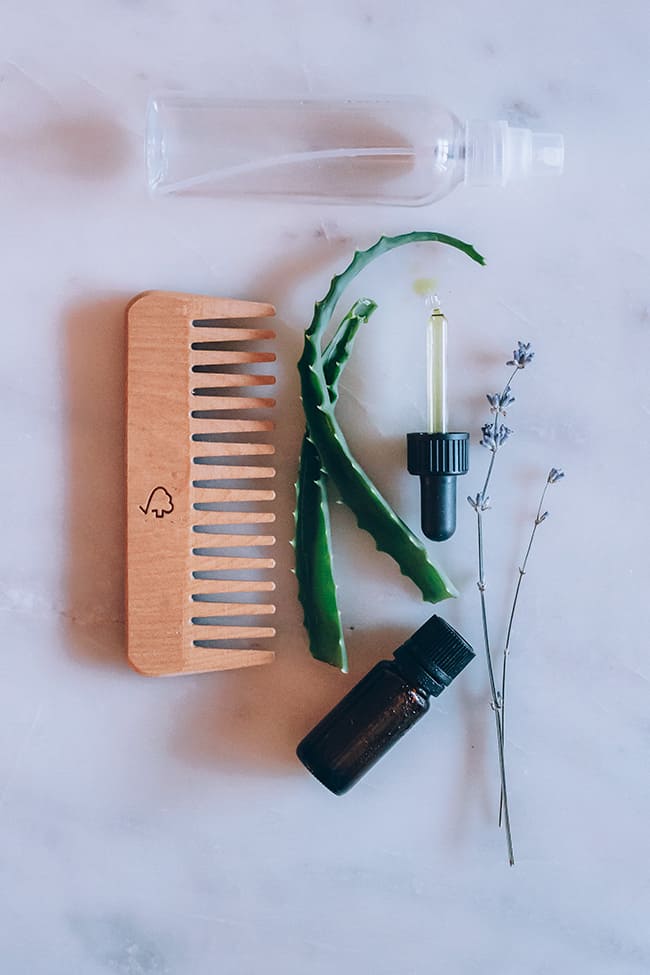
12. De-frizz hair spray
Did you know aloe is even good for your hair? Its polysaccharides actually restore moisture to hair to seal out humidity and add shine. Our hair gets especially frizzy in the hot, muggy heat, and this spray has all the right ingredients to keep hair smooth and silky.
13. Face wipes
These face wipes are just the thing to use after a good workout. Exercising works up a sweat and removes toxins, but the chemicals in sweat can build up and lead to acne if you don’t wash your face afterward. Having these wipes on hand is sure to keep your skin healthy and glowing. You’ll even smell fresh—thanks to the dried roses!
14. Soap
Given aloe’s gentle, soothing properties, it naturally makes for an amazing soap. It’s not as hard to make as you may think, either. You can spice up the recipe however you want using different oils, but aloe gives your hands a refreshing feel for the upcoming summer months.
This article was medically reviewed by Dr. Gina Jansheski, a licensed, board-certified pediatrician with over 20 years of experience in practice. Learn more about Hello Glow’s medical reviewers here. As always, this is not personal medical advice, and we recommend that you talk with your doctor before using this recipe to determine what’s best for you.
Photos by Ana Stanciu
79
Source by helloglow.co
